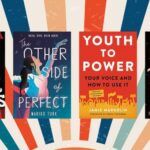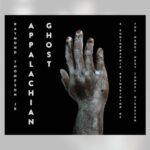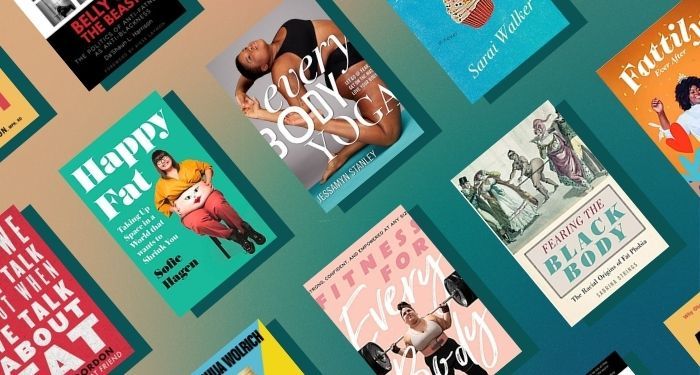
10 Anti-Diet Books for the New Year
The beginning of the year is a time full of possibility. However, one of the industries that seeks to exploit that desire for hope and change is the diet industry. With an endless barrage of posts about becoming the dream version of yourself or sticking to a diet that promises unbelievable results in mere days, it’s an especially hard time for people who are trying to make peace with themselves and their relationships with food. I personally feel like I’m constantly reporting and blocking ads for Weight Watchers and Noom and a million other services telling me to get on a diet or I’ll be unsuitable for human interaction. The way I’ve found to guard myself against these exploitative services is to read about the arguments and evidence presented in anti-diet books.
The most basic definition of diet is not insidious, but the diet culture that the weight loss industry has built up has turned the whole idea of one’s diet into a reflection on a person’s impulse control, morality, and beauty. An anti-diet mindset has to go hand-in-hand with an understanding of fat activism, because diets are so aggressively rooted in fatphobia. Although there are a lot of tricks in the way the wellness industry presents diets these days (beware the detox), most diets are rooted in the same history of weight loss and anti-fat discrimination.
Prejudices driven by the diet industry are part of why TikTok suppressed content by fat creators and other marginalized people. Understanding the insidious nature of diet culture and working against the stranglehold that the diet industry has on our thoughts about food is imperative for an actually healthy mindset with food.
Societal and Scientific Background
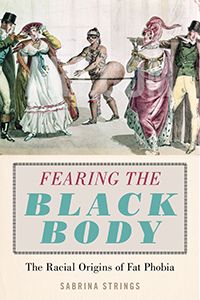
Fearing the Black Body: The Racial Origins of Fat Phobia by Sabrina Strings
This is the definitive text about the history of anti-fat bias that specifically motivates the diet industry in the U.S. In three sections, Dr. Strings charts the development of the white, slim, European beauty ideal that was constructed as a specific contrast to Black people always depicted in larger bodies thought to be more menacing. This is an extremely important book to read in an anti-diet journey because it forces you to question why you’re afraid of gaining weight. The anti-Black origins of fatphobia are encoded in all diet industry messaging.
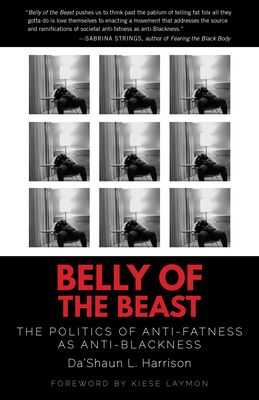
Belly of the Beast: The Politics of Anti-Fatness as Anti-Blackness by Da’Shaun Harrison
Da’Shaun Harrison uses the lens of anti-fat bias to elucidate the multi-faceted means of oppression in contemporary society. Fatphobia is not only about the oppression of the beauty standard, but a societal force that serves to marginalize people by restricting them from jobs, healthcare, and housing. Harrison breaks down how bias against fat people is compounded by blackness, queerness, gender, and disability. This is an important read for cultivating an anti-diet mindset because it is an urgent reminder of the active harm that the diet industry perpetuates by cultivating fatphobia in our brains.
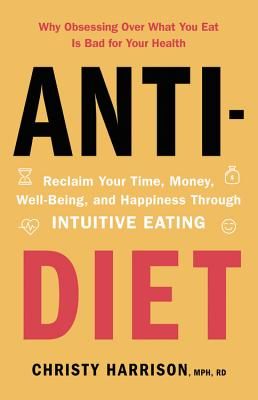
Anti-Diet: Reclaim Your Time, Money, Well-Being, and Happiness Through Intuitive Eating by Christy Harrison
Christy Harrison (who hosts Food Psych podcast) is a registered anti-diet dietitian who knows firsthand how much of your time and happiness can be lost to dieting (the Life Thief). Her practical guide to the anti-diet mindset gives readers information about the many insidious ways that the diet, health, and wellness industries profit from our unhappiness and how so many businesses keep us stuck in the dieting cycle. With stories from her own life, patients’ testimonies, and original research, Harrison unveils how intuitive eating and embracing an anti-diet mindset can give you a healthier, happier lifestyle overall.
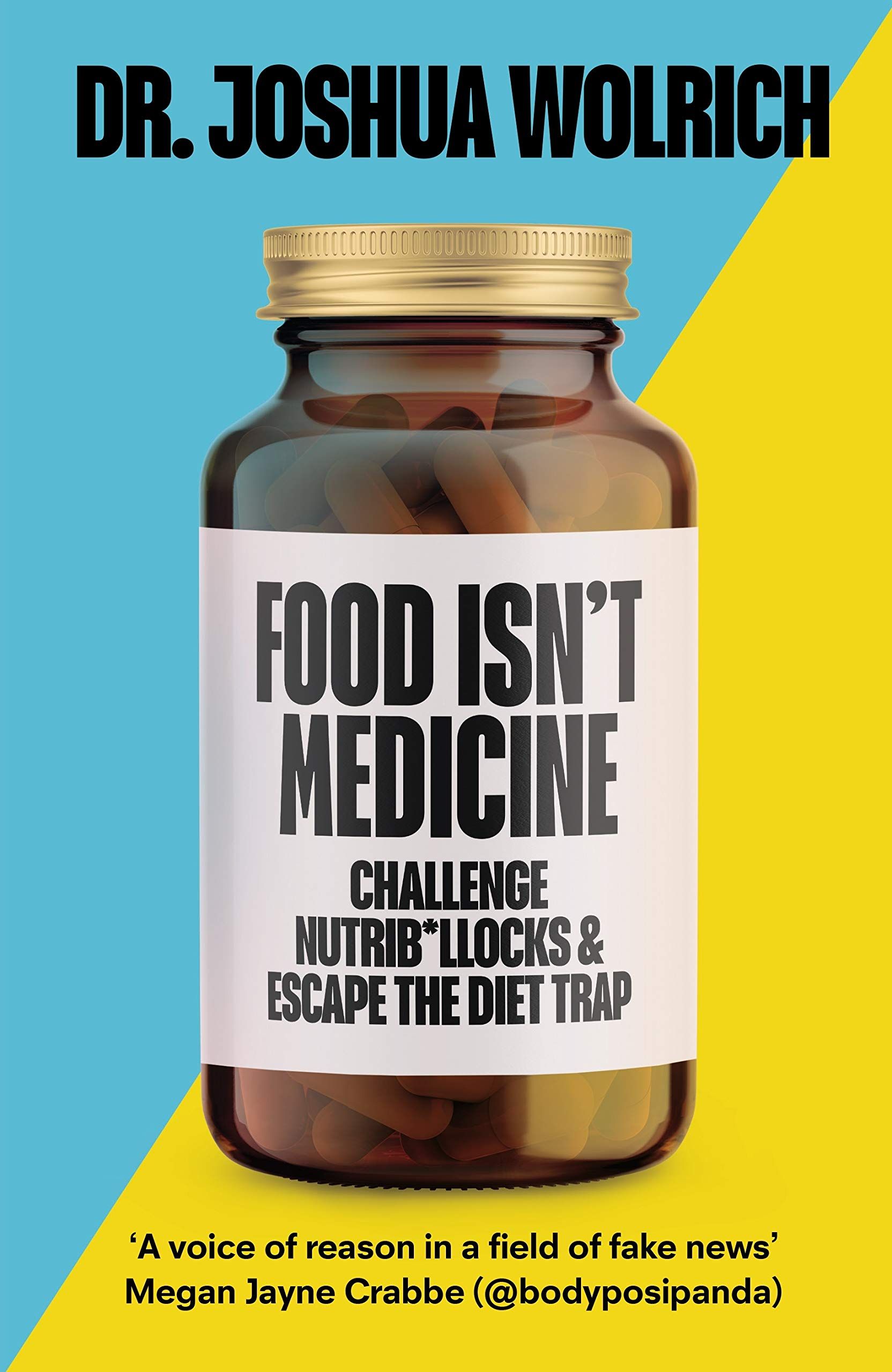
Food Isn’t Medicine by Joshua Wolrich
With a title that is sure to shock a lot of wellness influencers, Dr. Wolrich is out to debunk “nutribollocks” and give readers a stronger grasp on what food does and doesn’t do for your body. Dr. Wolrich’s main goal is to make sure everyone has a happier relationship with food that isn’t driven by weight stigma, because weight does not determine health. Instead of sweeping generalizations about food and how it affects everyone (like the abject lie that all bread is bad for you), this book prioritizes how individuals can make their own choices based on how they feel and stay away from damaging, restrictive diet trends.
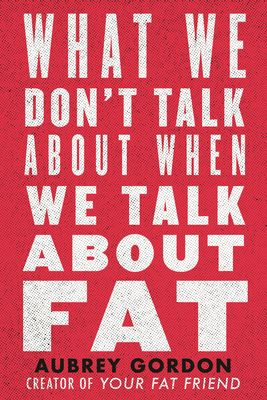
What We Don’t Talk About When We Talk About Fat by Aubrey Gordon
Now the host of the excellent podcast Maintenance Phase, Aubrey Gordon used to live online only as Your Fat Friend. Going further than the argument for internalized happiness, Gordon explains why fat activism is such a crucial part of the fight for social justice. Fatness is still an insidious justification for firing and the denial of housing and medical care (based on the stereotype of quality of life). The advice she had always been given was just to diet (or get surgery) and conform to the system so it won’t hurt you anymore. Her own mindset will always be grounded in fat justice, as she explains through her own experiences, because being fat is still treated as a morally reprehensible existence that justifies individual and societal violence against fat people.
Memoirs and Personal Accounts for the Self
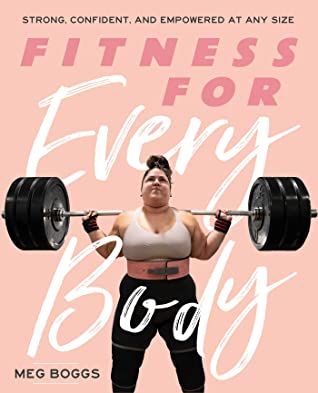
Fitness for Every Body: Strong, Confident, and Empowered at Any Size by Meg Boggs
On the more personal end of the spectrum, Meg Boggs offers practical advice and accounts of how to get into fitness as a fat person. Meg is an expert weightlifter and gives detailed guides about how to get into it yourself. She also addresses the way people equate thinness and strength, and encourages everyone to find their own strength and embrace fitness where they are, not as a tool for weight loss. She also gets into intuitive eating and how to navigate exercise after pregnancy. Instead of endless dieting, she advocates for peace with your body and treating it kindly.
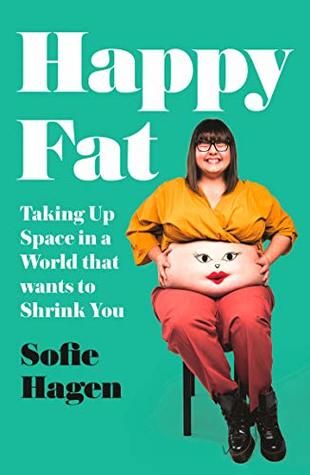
Happy Fat: Taking Up Space in a World That Wants to Shrink You by Sofie Hagen
Although this book is called Happy Fat, Sofie Hagen doesn’t shy away from the things that make her angry about society’s unfair treatment of fat people. Sofie is a comedian and her insights about common fat problems like airplane seats are hilarious and poignant. Sofie’s vision is also guided by the history of fat activism and fat liberation, which is a great way to develop an anti-diet mindset and choose to be joyful instead of self-flagellating.
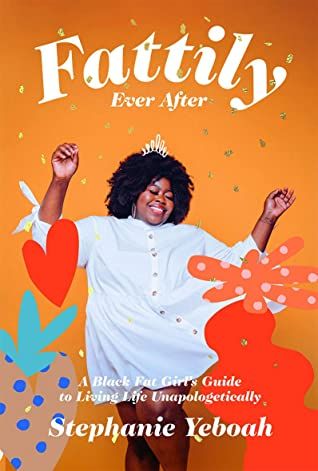
Fattily Ever After: A Black Fat Girl’s Guide to Living Life Unapologetically by Stephanie Yeboah
Stephanie has had to endure the double-edged sword of misogynoir and fatphobia for most of her life, but it’s driven her to celebrate herself even more and work to chip away at biases and unfair beauty standards. With personal stories and musings on historical inequality, Stephanie offers advice for Black women on how to navigate injustice and prioritize your joy in the face of a world that seeks to make you smaller and quieter.
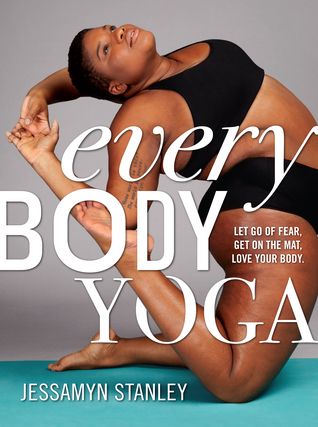
Every Body Yoga: Let Go of Fear. Get On the Mat. Love Your Body by Jessamyn Stanley
Yoga is categorically not the domain of thin white women drinking green juice. Jessamyn encourages everyone to get on the mat and find the poses and adjustments that can give them a fulfilling yoga practice and let go of the need to change your body to fit an imagined yoga standard. There are photograph guides of Jessamyn going through basic poses and flows. She encourages readers to use yoga as a space for themselves as opposed to a space to change your body into a more socially acceptable shape. Being more at peace will also help your anti-diet journey.
Anti-Diet Fiction
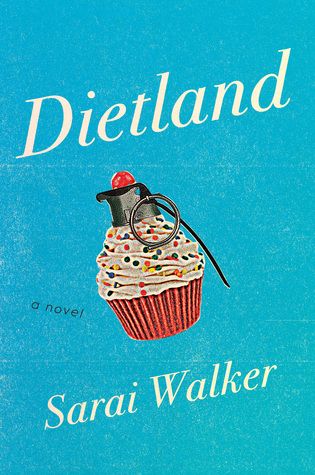
Dietland by Sarai Walker
Although this is fiction, this book contains an incredibly strong and relatable argument for intuitive eating and letting yourself eat and scream and feel without restriction. Plum Kettle is a plus-sized woman with a small life who is getting ready for weight loss surgery that she assumes will fix everything. While working for a women’s magazine, Plum joins a radical group of women who push at society’s unfair structures from the underground, and she rethinks everything she thought she knew about fatness and beauty. It’s a searing indictment of the diet industry and how it seeks to silence all dissenters through shame. And there’s a television adaptation, too!
Arm Yourself With Knowledge
Once I started on my anti-diet journey, the next step had to be finding a more peaceful way to feed myself. Books about health at every size are helpful for this next step, but I also found podcasts and writing about fat liberation and fat positivity crucial for guiding my approach to social justice issues. The diet industry seeks to push us to avoid fat at all costs, but the fat liberation movement has existed for just as long to push back against those assumptions. In addition to the books, there are a ton of podcasts that can help you understand the issues even further, like She’s All Fat, Maintenance Phase, and The Fat Lip.
For more reading about injustice and how to address it in your own life, check out books about disability justice, mental illness, and the importance of representation.









